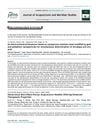 December 2023 in “Farmateka”
December 2023 in “Farmateka” Minoxidil is an effective and safe treatment for common hair loss when applied to the skin, but more research is needed for optimal use.
November 2023 in “IntechOpen eBooks” Arsenic exposure from contaminated water severely damages the skin, causing hair loss, pigmentation changes, irritation, and can lead to skin cancer.
August 2023 in “Frontiers in Oncology” New drugs and therapies targeting specific pathways show promise in treating advanced prostate cancer.
June 2023 in “International journal of molecular sciences” Heat stress changes goats' skin and hair at the microscopic level and affects their genes and skin bacteria.
May 2023 in “CRC Press eBooks” Liposomes can improve hair care and treat hair issues effectively.
Finasteride may help reduce COVID-19 infection by altering a key gene.
 April 2023 in “The journal of investigative dermatology/Journal of investigative dermatology”
April 2023 in “The journal of investigative dermatology/Journal of investigative dermatology” Low-intensity ultrasound may protect hair follicles from damage caused by a common chemotherapy drug.
 April 2023 in “Journal of Investigative Dermatology”
April 2023 in “Journal of Investigative Dermatology” ALRN-6924 can protect hair follicles from chemotherapy damage by temporarily stopping cell division.
 April 2023 in “The journal of investigative dermatology/Journal of investigative dermatology”
April 2023 in “The journal of investigative dermatology/Journal of investigative dermatology” Aging changes female scalp cells, likely affecting hair health.
Ribonucleotide excision repair is crucial to prevent skin cancer.
Ribonucleotide excision repair is crucial to prevent skin cancer.
 January 2023 in “Frontiers in bioscience”
January 2023 in “Frontiers in bioscience” Artemis protein may help control hair growth and health by influencing cell processes.
 January 2023 in “Postępy Dermatologii i Alergologii”
January 2023 in “Postępy Dermatologii i Alergologii” Azelaic acid treats acne, rosacea, and hyperpigmentation with minimal side effects.
 November 2022 in “Journal of Investigative Dermatology”
November 2022 in “Journal of Investigative Dermatology” Aging in one type of stem cell can cause aging-like changes in various organs.
 November 2022 in “Journal of Investigative Dermatology”
November 2022 in “Journal of Investigative Dermatology” Apocynin may protect skin cells from aging and damage caused by UVB light.
 November 2022 in “Journal of Investigative Dermatology”
November 2022 in “Journal of Investigative Dermatology” The document concludes that a new method has been developed to test anti-aging substances on human skin, showing that these substances can reduce skin aging signs.
 November 2022 in “Journal of the Endocrine Society”
November 2022 in “Journal of the Endocrine Society” A boy with a new NR5A1 gene mutation has a sex development disorder without affecting his adrenal glands.
 August 2022 in “The journal of investigative dermatology/Journal of investigative dermatology”
August 2022 in “The journal of investigative dermatology/Journal of investigative dermatology” Increasing type 17 collagen reduces aging signs in skin cells caused by UV light.
 May 2022 in “Experimental dermatology”
May 2022 in “Experimental dermatology” Trichothiodystrophy hair is structurally abnormal with protein and organization issues.
 May 2022 in “International Journal of Biochemistry Research and Review”
May 2022 in “International Journal of Biochemistry Research and Review” Plant-based biotin from SesZenBioTM could be twice as effective as synthetic biotin for hair care.
May 2022 in “The journal of investigative dermatology/Journal of investigative dermatology” Loss of TET2 increases the risk of skin and oral cancer.

Antioxidant therapy, especially with selenium, can improve skin aging in patients with Metabolic Syndrome.
 July 2021 in “Advances in laboratory medicine”
July 2021 in “Advances in laboratory medicine” Diagnosing sex development disorders requires combining medical history, physical exams, imaging, lab tests, and genetic data.
Different types of sun exposure damage skin cells and immune cells, with chronic exposure leading to more severe and lasting damage.
Androgens increase norepinephrine release, promoting smooth muscle growth in male sex organs, which may contribute to benign prostatic hypertrophy.
 April 2019 in “Journal of Investigative Dermatology”
April 2019 in “Journal of Investigative Dermatology” Caffeine can protect scalp hair follicles from damage caused by UV radiation.
 April 2019 in “Journal of Investigative Dermatology”
April 2019 in “Journal of Investigative Dermatology” Skin grafts from related donors significantly healed chronic wounds in patients with a severe skin condition over a year.
 March 2019 in “Journal der Deutschen Dermatologischen Gesellschaft”
March 2019 in “Journal der Deutschen Dermatologischen Gesellschaft” Rothmund-Thomson syndrome type 2 can cause chronic, poorly healing wounds.
January 2019 in “Springer eBooks” PLGA nanospheres in cosmetics improve skin and hair treatment effectiveness.
 June 2018 in “Journal of Acupuncture and Meridian Studies”
June 2018 in “Journal of Acupuncture and Meridian Studies” New technologies in acupuncture and biosensors show promise for better medical treatments and healing.



















